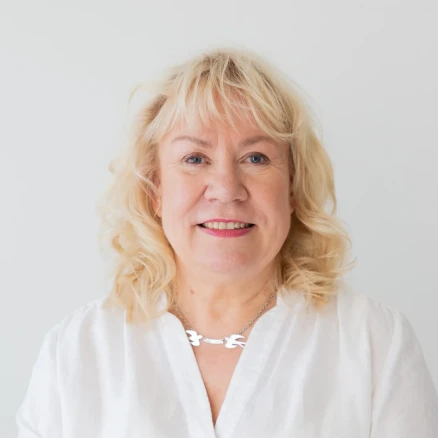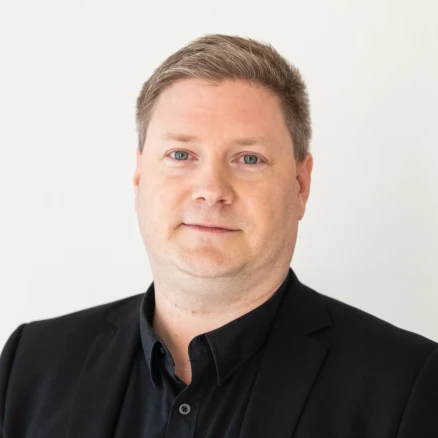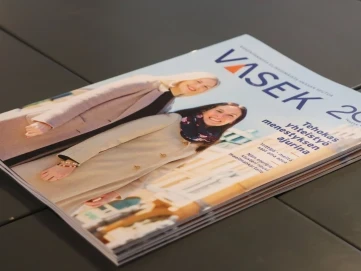The World Can Be Left to Future Generations Only Through Collaboration
On the 19th of May, a delegation of about 50 people from Groningen, the Netherlands, visited Vaasa. The group included regional ministers, the Mayor of Groningen, CEOs of various companies, as well as others in senior positions.
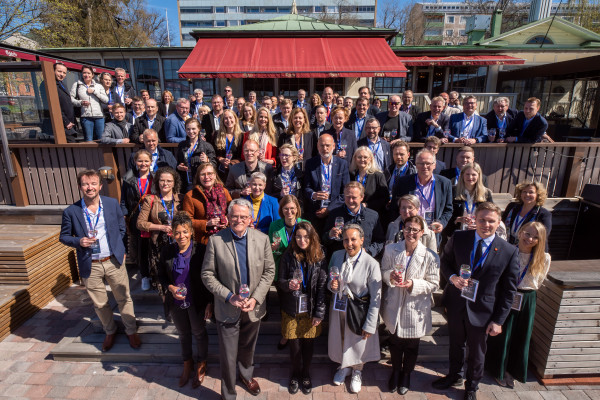 On the 19th of May, a delegation of about 50 people from Groningen, the Netherlands, visited Vaasa. The group included regional ministers, the Mayor of Groningen, CEOs of various companies, as well as others in senior positions. The visit, organised by the Province and the Municipality of Groningen, was carried out jointly with Finnish partners and the Embassy of the Kingdom of the Netherlands in Finland. It aimed to enhance cooperation between the two countries, particularly in renewable energy, transport and education.
On the 19th of May, a delegation of about 50 people from Groningen, the Netherlands, visited Vaasa. The group included regional ministers, the Mayor of Groningen, CEOs of various companies, as well as others in senior positions. The visit, organised by the Province and the Municipality of Groningen, was carried out jointly with Finnish partners and the Embassy of the Kingdom of the Netherlands in Finland. It aimed to enhance cooperation between the two countries, particularly in renewable energy, transport and education.
The delegation also visited Gothenburg, Stockholm, Helsinki and Luleå. The Vaasa visit was hosted by the City of Vaasa, the Regional Council of Ostrobothnia, the Ostrobothnia Chamber of Commerce, Vaasa Region Development Company VASEK and Technology Centre Merinova. The programme of the day included theme discussions as well as corporate visits.
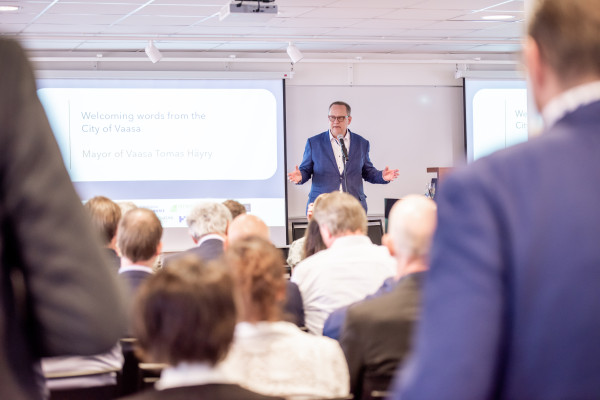 Mayor of Vaasa, Tomas Häyry
Mayor of Vaasa, Tomas Häyry
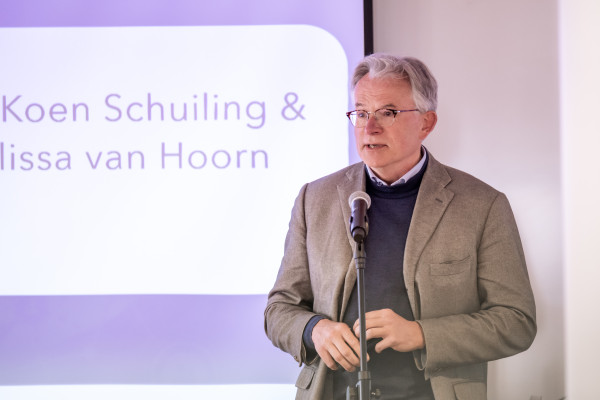 Koen Schuiling, the Mayor of Groningen
Koen Schuiling, the Mayor of Groningen
The morning programme was held in Hanken, Vaasa. The opening words of the Mayor of Vaasa, Tomas Häyry, and Koen Schuiling, the Mayor of Groningen, were followed by a key note speech by CEO of Vaasan Sähkö Stefan Damlin (in the photo below), which shed light on the green transition from the Finnish perspective and the EnergySampo work done in Vaasa.
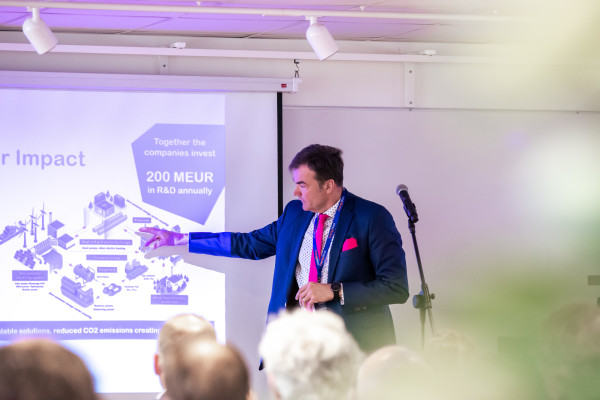
– The challenges of global warming and rising energy prices are familiar to everyone, and the energy market is changing rapidly. Working together in the EnergySampo ecosystem can create collaboration on the system level and not just in specific areas. We can also do R&D work together and create pilots on a global level. No company solves these problems on its own, Damlin reminded.
Patrick Cnubben, in turn, introduced the Groningen Hydrogen Valley model of an integrated hydrogen economy to aid in steps towards a fully hydrogen-based society. Interconnected hydrogen valleys are being set up across Europe, and suitable partners are also sought in the Nordic countries.
The theme discussion led by Hycamite’s Matti Malkamäki dealt with hydrogen and carbon capture and their use in both energy systems and industry. At the same time, the guests were introduced to regional pilots. The hydrogen industry is clearly developing at such a pace that you have already missed something if you dare to blink an eye. It would be important for Finnish and Nordic operators to be present in the European arena. The cooperation with the hydrogen valley of Groningen, for example, may open up new possibilities for it.
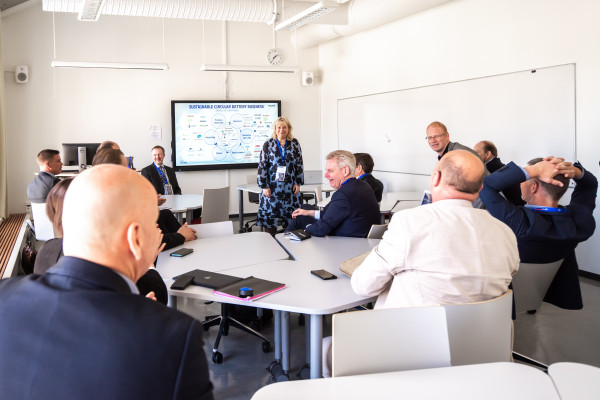 Nordic Battery Belt theme discussions going on
Nordic Battery Belt theme discussions going on
VASEK’s Development Director Riitta Björkenheim led a discussion group on the Nordic Battery Belt, i.e. energy storage and development of the battery industry in Finland, Sweden and Norway. The guests were also acquainted with Kokkola Industrial Park and the GigaVaasa area. “Even though we were not moved to tears, we are very impressed with your work on building the battery value chain. The work has long since passed the initial stage,” commented the Groningen representatives.
VASEK also steered the third group. Anna Måtts-Fransén, VASEK’s logistics expert, dealt with the subject of sustainable transportation options. The group reviewed and discussed the transportation forms and their best practices in the Kvarken region. The Groningen delegation’s representatives introduced the development of digital transportation and even numerous concrete cooperation possibilities in carbon-neutral transportation. The electric aviation sector and the upheaval it has brought to the area and cross-border cooperation were also discussed. It was concluded that “Technology or the lack of it no longer stops the green transition, but technological development must be supported politically and economically. Laws and restrictions should not complicate progress”.
In the fourth group, the topic was human capital, i.e. competition for experts, education and combining competencies, cooperation and sharing expertise. Led by Mikael Hallbäck, Director of the Ostrobothnia Chamber of Commerce, the group found that Groningen and Ostrobothnia’s insights regarding lifelong learning and changes in learning culture were very similar. Both areas even had Energy Academy activities in their regions. The theme group already considered the next cooperation steps and agreed on return visits.
Mats Brandt, Regional Mayor of the Regional Council of Ostrobothnia, guided his theme group to discuss international and regional cooperation opportunities and how to utilise others' experiences of cross-border cooperation. Throughout the visit and the discussions, the constant cooperation between Umeå and Vaasa was opened up to the members of the Groningen delegation. In addition to the common Kvarken area — the sea, beaches and nature — the cities share the port, and they are launching collaboration also on the strategic level.
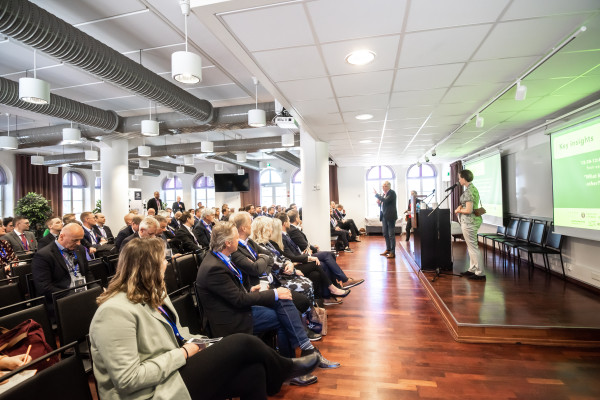
After theme discussions and lunch, the delegation's journey continued with a visit to Wärtsilä's Smart Energy Hub, followed by buses to Palosaari campus, Citec and Runsor, GigaVaasa area, Westenergy and Danfoss.
Both organising parties and delegates were very pleased with the day, the discussions and the networking. Hanken’s Kaisa Penttilä and Merinova’s Triinu Varblane, and the rest of the organising team received deepest thanks for the successful arrangements. Cooperation, the desire to engage in discussions and the ability to take steps forward are needed to overcome the challenges of energy transition as well as the future and to take steps away from fossil energy sources.
At the end of the discussions, it was stated that “Our goal is to leave the globe to future generations, anything less is not enough”. No one disagreed.
